Cryptocurrency Debit Card Services (Ethereum & Bitcoin)
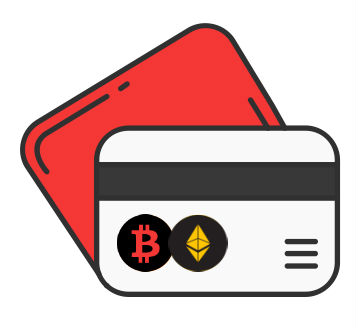
Since the day cryptocurrencies came into existence, we have been constantly reimagining their practical real-life application. Some people remained skeptical as to whether the ecosystem will grow enough to compete with traditional currency, while others believed that the future worldwide economy would not only manage to adapt digital currencies, but would also provide all the necessary conditions to completely digitalize the whole monetary system. Today, when we have to face the unprecedented outburst of popularity of cryptocoins across the world, there is a strong need for providing cryptocurrencies with a way to be used in people’s everyday life.

Exchanging bitcoins or ether to fiat money in order to be able to spend them was initially a good idea, but the digital currency becomes more and more valuable every day, making it less practical to be exchanged for an immediate use. Many people would like to be able to use their bitcoins or other digital currency when going out for groceries or visiting restaurants on a daily basis. Thus, adapting cryptocurrencies for real-world transactions can essentially simplify a payment routine for those willing to spend their crypto-coins in a more traditional way. This is one of the main reasons why cryptocurrency debit card services are emerging.
In this post, we will tell you about the specifics of cryptocurrency debit cards and how they solve the problem of lengthy blockchain transaction processing, among many others. In addition, here you will find a list of the best cryptocurrency debit card services that can be used by Bitcoin and Ether holders with some of them supporting alternative coins as well.
Table of contents
What are cryptocurrency debit cards?
Cryptocurrency debit cards look exactly like traditional debit cards. The only difference is that you can store cryptocurrency on them. These cards are also issued by already existing international payment systems, such as Visa or MasterCard, which makes it possible to use them with any point-of-sale terminal around the world. However, the actual transactions can be possible only through converting cryptocurrencies into a corresponding fiat currency. This has been done primarily because there are currently no effective POS systems that would support digital currency payments, nor there are enough businesses that would be interested in providing their ventures with those systems.
Types of cryptocurrency cards
So far, there are two types of cryptocurrency cards available:
- pre-paid cards
- debit cards
The first type of cards is more of a pseudo-cryptocurrency one, as you only need your crypto-coins to be paid directly to your service provider that:
- creates a personal account for you;
- sends you a personalized debit card;
- converts your crypto-coins to fiat money and puts them on your account.
So once you get your card, it will already have real money on it, so, technically, you are going to deal with a more or less traditional card payment system.
The second type of cards is a bit more interesting one, because it introduces an automated exchange system operating independently and requiring no actual involvement from the user. This, indeed, allows for a faster and more flexible payment procedure with decent transaction fees charged by the debit card service providers.
Cryptocurrency debit card transaction processing
However, there is a more profound way of distinguishing debit card services, namely by the technology that is being used for processing user payments.
Traditional blockchain transaction processing
The majority of existing cryptocurrency debit card services tend to perform as a third party providing users with online cryptocurrency wallets connected to their debit cards. Sending funds within the provider’s system is usually done for free and takes no time to be processed. However, if you need to send your bitcoins to an external user or to simply exchange them to a fiat digital currency through the provider’s app, the transaction processing will have to take place on the common blockchain. This means that you will have to pay a corresponding miner fee, and the transaction itself will take some time before it becomes approved. If you choose to pay a standard priority transaction fee, your transaction will need to be confirmed within the next 6 blocks; if you choose a high priority transaction fee, your payment will be confirmed within just 1 or 2 blocks. This type of payment processing system, however, does not seem to be as seamless and fast as it should have been, especially considering the innovative nature of the cryptocurrency ecosystem.
Alternative (off-chain) transaction processing
Recent years have seen an influx of completely new transaction processing systems that aim to overcome the limitations imposed by existing on-blockchain rules. The concept behind those networks is presented by an off-chain micropayment system which significantly reduces both transaction fees as well as the overall time period of transaction processing. Notable payment systems include (mostly for Bitcoin), (for Ethereum), and (currently working with Ethereum, Dash, and Bitcoin).
The basic mechanism behind the off-chain micropayment system is to create a person-to-person multisignature payment channel which is then introduced as a new entry on the public ledger. Each party needs to create a transaction, according to which the funds from the entry will be allocated to the respective user account, and sign it. In fact, each party can create as many transactions as he or she wants, but only the most recent one of them will be considered valid. Once the final transaction was made, either party can independently close the public ledger entry, and its latest value will subsequently go to the blockchain. This mechanism is basically spread to all users of the network, which means that all participants can create a multisignature payment channel with each other.
Overall, the three abovementioned off-chain payment systems are based on the same technology, with a number of smaller modifications in implementation. Their main benefits include:
- Instant payments which take place off-chain and get confirmed in no time;
- High-level security provided by the smart-contract technology and a direct person-to-person interaction without the involvement of custodians.
-
Low transaction fees, which became possible thanks to introducing a micropayment model. Thus, sending small funds within the Bitcoin blockchain would still require the payment of a standard miner fee, which would make the whole payment completely impractical. Lightning Network, for instance, sets up a fee by calculating the actual volume of funds involved in the transaction.
-
Large application opportunities.They can be effectively used as a backend for debit card service providers and other decentralized applications. COMIT, for instance, is going to be used for running user payments in TenX – a new multi-asset debit card service which connects all blockchains together to let users store their funds in any cryptocurrency they like.
Advantages of cryptocurrency debit cards
Apart from introducing a more convenient way of spending digital money, cryptocurrency debit cards also solve a range of other problems:
- Preventing unreasonably high currency exchange fees. This is especially the case when you frequently travel around the globe and need to use your debit card to pay for products and services in a respective local currency.
-
No need to keep your funds in cash. Exchanging money to a local currency and carrying big sums in your pocket can turn out to be risky, so having a cryptocurrency debit card will minimize the risk of losing your funds.
-
You can store as much money as you want on your cryptocurrency debit card. Basically, if you have significant cryptocurrency funds in your digital Bitcoin or Ethereum wallet, you may just deposit some of the available units to your debit card, thus securing the remaining funds from any potential risk.
- Cryptocurrencies gradually spread across the world. And we are talking not only about online retail shops and marketplaces like Overstock or BitcoinStore that successfully included Bitcoin to their payment options. There are quite numerous physical stores, restaurants and hotels that already accept bitcoins as a form of payment.
Now let us take a look at popular cryptocurrency debit card services and see their pros and cons in regards with their fee system, service quality, and limitations of use.
Bitcoin debit card services
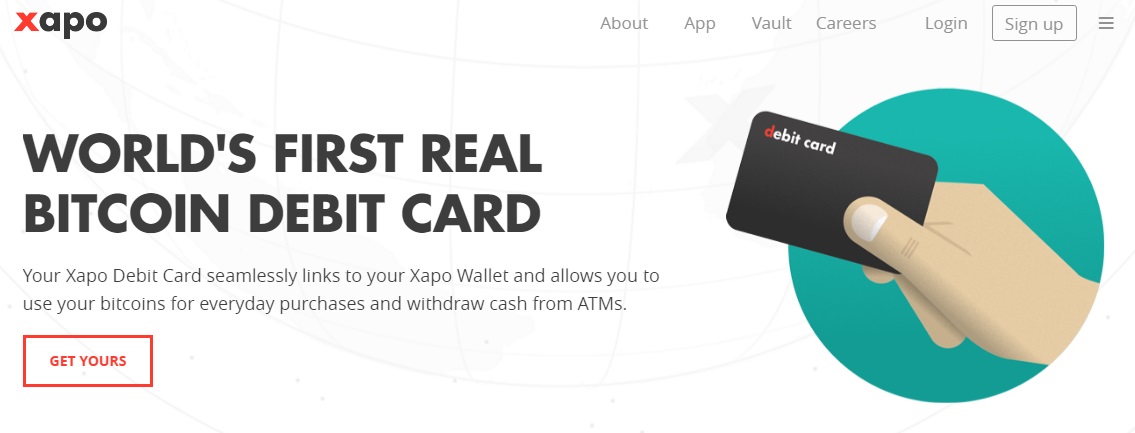
Xapo is one of the first bitcoin payment services providing their own wallets and debit cards to the users. Their main priority is security, which is why they built three offline servers that store all private information of their clients in remote and hardly reachable geographical locations protected by smart security systems and people.
You can purchase a VISA-based plastic debit card only, virtual cards are not available. In addition, if you are not a verified user, you will have a limit for conducting online and point-of-sale transactions.
- Available: China, Japan, Canada, almost everywhere in Europe, but NOT in the US.
- Physical card issuance fee – $20
- Card load fee – 1%
- Annual fee (first year – free) – $12
- PIN change fee – $1
- Purchase fee in card’s spending currency – $0
- Foreign currency purchase fee – 3%
- Card replacement fee – $12
- Domestic ATM withdrawal fee– $2.50
- ATM withdrawal fee (in other countries) – $3.50
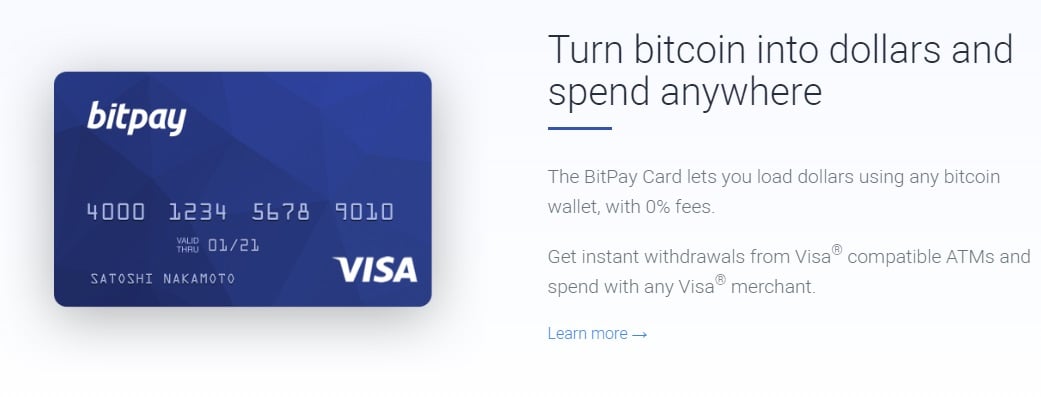
Bitpay is a well-known bitcoin payment company offering pre-paid VISA cards for a daily use. Due to only working with pre-paid cards, the company will first require paying a card order fee and providing your personal data, including ID, home address, and Social Security number. On the successful verification, your card will be shipped to your home address. Then you will need to activate your card and load it with dollars that have been previously converted from bitcoins you paid to the service provider.
Apart from requiring additional verification, Bitpay cards also do not have chip and pin for payment confirmation purposes.
- Available: ONLY in the US
- Physical card issuance fee – $9.95
- Card load fee (only through Western Union and GreenDot) – up to 4.95 per load
- Transaction fee – $0
- Foreign currency conversion fee – 3%
- Card to card transfer limit – $500/day
- Domestic ATM withdrawal fee – $2
- ATM withdrawal fee (outside the US) – $3
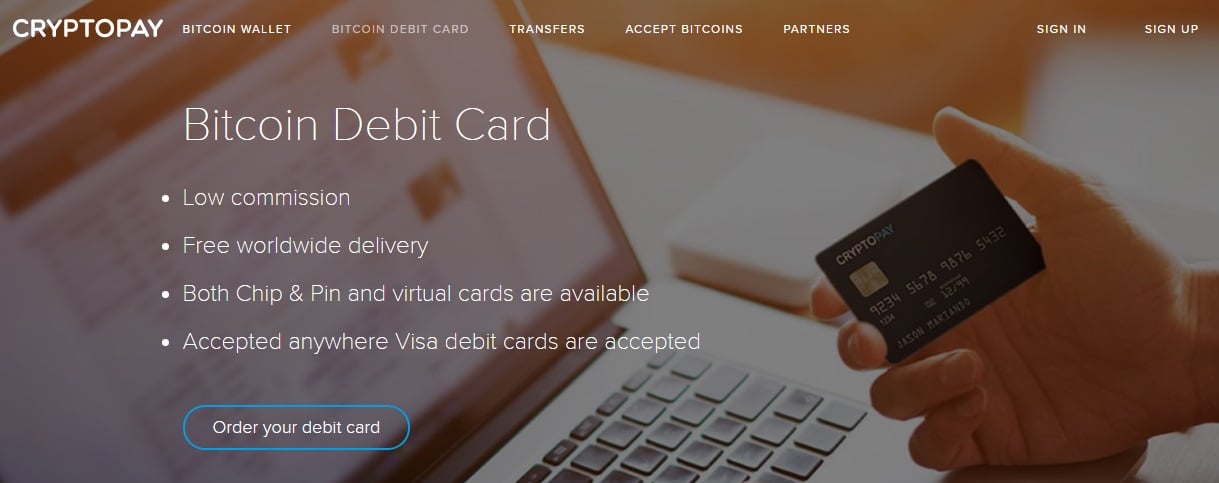
Unlike Bitpay, Cryptopay offers both plastic VISA debit cards and virtual cards. ID verification is not obligatory but is required in case if you need to expand your debit card limits. Physical debit cards do have chip and pin, so they are more secure and will be accepted everywhere.
- Available: worldwide
- Plastic card issuance fee – $15.00
- Virtual card issuance fee – $2.50
- Standard worldwide delivery fee – $0
- Domestic ATM transaction fee – $2.50
- International ATM Transaction fee – $3.50
- Foreign transaction fee – 3%
- Monthly service fee – $1.00
- Card load fee – 1%
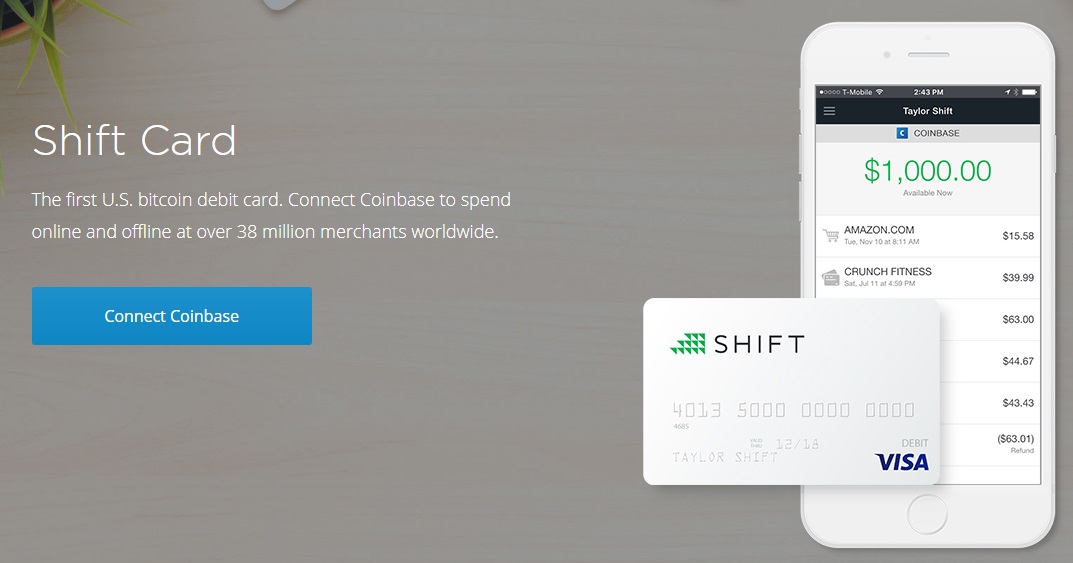
Shift debit cards are available as VISA plastic cards and virtual debit cards. Unlike many other bitcoin debit card services, Shift does not have its own user wallet. Instead, it has integrated Coinbase wallets to their system, which allows Coinbase users to make payments in Bitcoin right from their Coinbase accounts, with an automated BTC/USD conversion per every transaction.
- Available: US only
- Physical card issuance/replacement fee – $10
- Annual fee – $0
- Domestic Transaction fee – $0
- BTC to USD conversion fee – 0%
- Domestic ATM withdrawal fee – $2.50
- International Transaction fee – 3%
- International ATM withdrawal fee – $3.50

The company offers both virtual (VISA) and physical (Mastercard) debit cards that can be managed through a user-friendly mobile app (available for and ). On the other hand, the verification process can take up to 10 working days and will require an additional phone confirmation call.
- Available: worldwide
- Standard card delivery fee – $0
- Virtual card issuance fee (only for the first one) – $0
- Transaction fee – $0
- Domestic ATM transaction fee – $2.50
- International transaction fee – $3.50
- Monthly SMS notification fee – $1
- PIN change fee – $1
- Foreign Transaction Fee – 3%
- Card to Card Transfer – $0.25
- Number of purchases (per day) – unlimited for both POS and online purchase
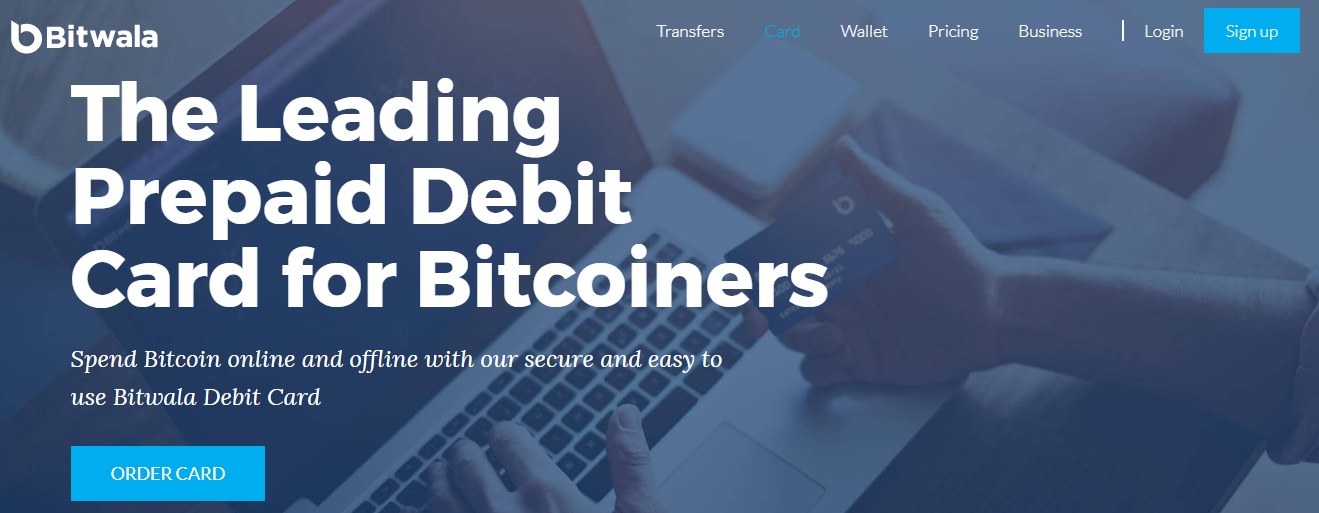
This is another pre-paid bitcoin card provider that issues virtual and physical VISA debit cards. In order to be able to use the card, you will need to go through a ID verification process. The system’s primary currency is euro, but it also supports 19 other currencies as well as 44 altcoins. The overall price range is much lower than in other bitcoin debit card providers. However, one of the significant flaws of the service is that it provides third-party exchange rates, so, before applying for the card, make sure you compared Bitwala’s external exchange rates with those offered by other exchanges.
- Available: worldwide
- Physical card issuance fee – €8
- Virtual card issuance fee – €2
- Single card load fee – 0.5% (min. €1)
- Monthly card fee – €1
- Card load fee – 0.5%
- POS fee – €0
- Domestic ATM transaction fee – €2.25
- International ATM transaction fee – €2.75

The company offers both plastic and virtual debit cards powered by VISA and Mastercard payment systems. Its major currencies are EUR, USD, GBP, and RUB. The latter allows to expand the bitcoin debit card market to Russia. Verification is not required, but might be needed if you look for expanding your card opportunities. Among the drawbacks of the service is the absence of any mobile app, but the team is working on that at the moment.
- Available: in 50 countries, excluding US, Venezuela, Middle-East countries, and Africa.
- Physical card issuance fee – $4.99
- Virtual card issuance fee – $1
- Maintenance fee (per month) – free
- Card load fee – $0.99
- Purchase fee – $0
- Currency exchange fee – 2.95%
- ATM withdrawal fee – $1.99
- PIN change fee – $1
- Card replacement – $9.99
Ethereum / Multi-currency debit card services

TenX is a young Ethereum-based project that has just successfully completed their crowd sale and raised over $80 million thus providing itself with wide growth opportunities. The company’s debit card service, however, existed long before their ICO took place. Currently, the TenX debit card supports a range of the most popular crypto-coins, including those of Bitcoin, Ethereum, Dash, and even ERC20 tokens. What’s more important, TenX is the first debit card platform allowing users to store funds in cryptocurrency. In addition, the service will soon attract even more cryptocurrencies that will be available for a daily use.
Now when you know that TenX prepares to operate on the basis of the COMIT network (which translates as Cryptographically-secure Off-chain Multi-asset Instant Transaction and is, in fact, created by the TenX team), you get to better understand why it has such a huge potential for the cryptocurrency debit card infrastructure. The COMIT launch, by the way, is scheduled for the first part of 2018.
One of the major incentives of the TenX platform, however, is aimed towards TenX’s token holders that will be rewarded 0.5% from each transaction in ether equivalent. As for the TenX card holders in general, they will automatically be rewarded 0.1% from each transaction in PAY (TenX token) equivalent.
The company has recently introduced their exclusive web app and an iOS wallet allowing for a convenient card management.
- Available: NOT in the US, most African countries, Middle-East countries, Belarus.
- Physical card issuing fee – $15
- Virtual card issuing fee – $1.5
- Card annual fee – $0 ($10 if spent less than $1,000 per year)
- Sending and exchange fee – 0%
- ATM transaction fee – $2.75 (+ additional fee for some ATM providers)
- Foreign exchange fee – $0
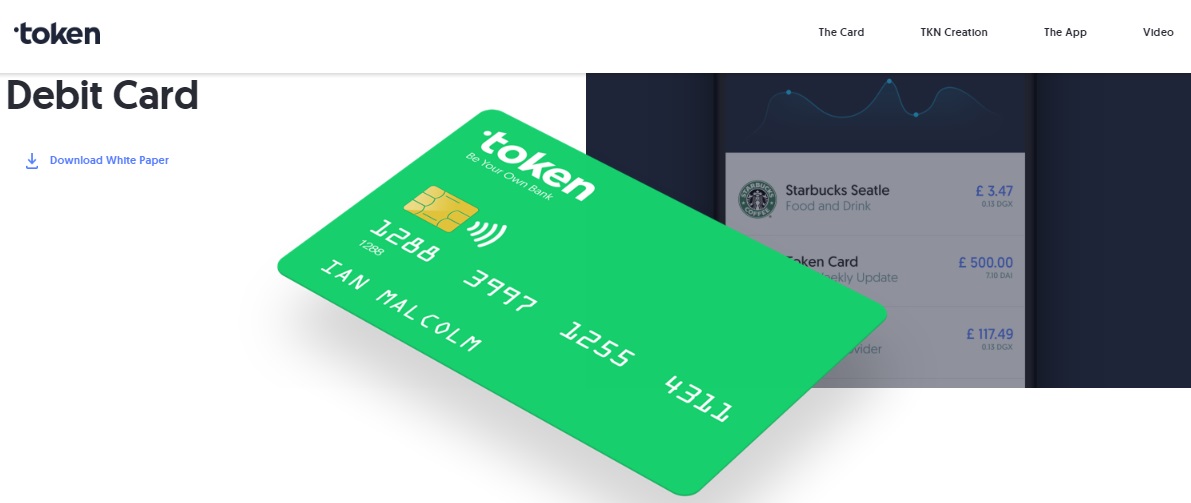
TokenCard is a new Ethereum-based debit card service that was made exclusively for depositing and spending ERC20 tokens. The first 500 debit cards are expected to be issued in September 2017 for top 500 ICO backers. The beta version of the platform will be released somewhere in November this year.
TokenCard users will be able to freely spend ether and other Ethereum-based tokens (including TKN – TokenCard tokens) from their contract wallets without the need to deposit them to the actual debit cards. The contract wallet is, in fact, an Ethereum smart contract wallet that operates as a user’s token bank account, so once you swipe your card at the PoS terminal, funds are taken from it. If you want to spend your tokens, you first need to set an allowance on your contract wallet. It can be a one-time sum or a regular sum with a personalized daily limit. For instance, an allowance could be 5 ETH per day. TokenCard fees are set around 1.5% for regular tokens, such as ETH and REP. However, if you spend your funds in TKN, the fee will be reduced to just 0.5%.
TokenCard is still at the beta-testing stage of the development, but the team expects to provide their debit cards to as many countries as possible, including the US and India (although at the beginning it will not be possible). In addition, the company is currently working on their own web/mobile app development.
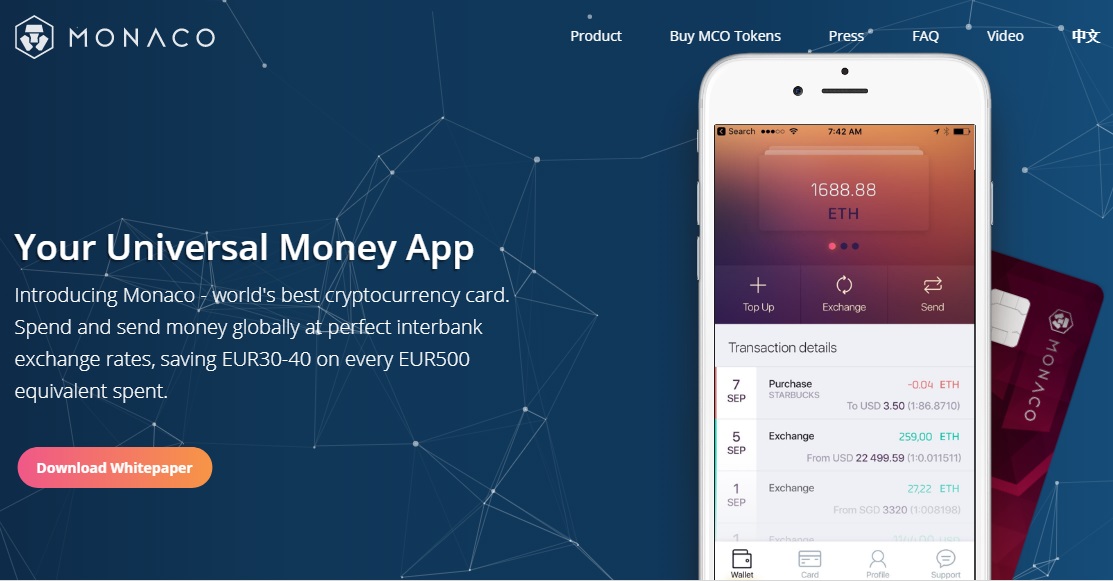
Monaco is an already running cryptocurrency debit card platform that has also gone through an ICO to raise funds for a further service development. The service provides VISA debit cards that can be deposited with Bitcoin, Ethereum, and ERC20 tokens. However, their primary credit unit is their own currency – MCO token.
Those who possess MCOs after supporting Monaco crowdsale are open to huge incentives and rewards from the daily use of their debit cards. Monaco card holders will be rewarded up to 10% (in MCO equivalent) from every transaction when spending at participating merchants. Later you will be able to sell your MCO tokens on various exchanges and easily convert them to BTC, ETH or fiat currencies. The more tokens are in use, the higher is their value, which means that cashbacks will inevitably rise in fiat currency equivalent over time.
Moreover, Monaco team has decided to provide their early supporters (specifically 999 users) with a limited edition of Monaco VISA Black Cards. The 001 card will be given to a backer with the largest token contribution during the ICO, and it will be charged with 188,888 MCO bonus tokens. In addition, Monaco VISA Black Cards will also allow for:
- triple monthly free ATM withdrawal limit;
- lifetime unlimited perfect interbank exchange rates.
The latter advantage, by the way, nicely correlates with another priority of the Monaco platform – to provide their users with the most appealing interbank exchange rates. The team claims that the platform will choose from multiple exchanges allowing users to save around EUR30-40 on every EUR500 transaction.
- Available: in 120 countries worldwide
- Transaction fee for spending within the app – 0%
- Software license fee (for transactions with BTC, ETH and other ERC20 tokens) – 1% (this fee is expected to support the MCO growth in value)
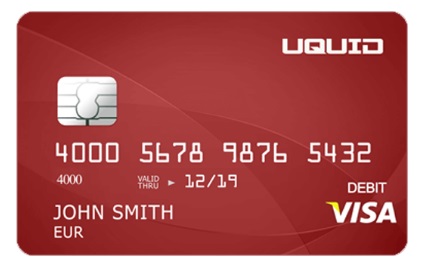
Uquid provides a neat cryptocurrency debit card platform which runs on a decentralized blockchain technology. The service issues both virtual and plastic VISA debit cards which support deposits in more than 40 cryptocurrencies, including Bitcoin, Ethereum, Ripple, Litecoin, Monero, Dash, Augur, MaidSafeCoin, Steem and Dogecoin. Unlike many other cryptocurrency debit card providers, Uquid does not require any ID verification, so you are free to use it anonymously.
- Available: worldwide, but NOT in the US
- Physical card issuance fee – $1
- Virtual card issuance fee – $1
- ATM withdrawal fee – $0
- PoS transaction fee – $0
- Foreign transaction fee – 3%
- Card load fee – 1.5%-5%
- Monthly fee – $1









